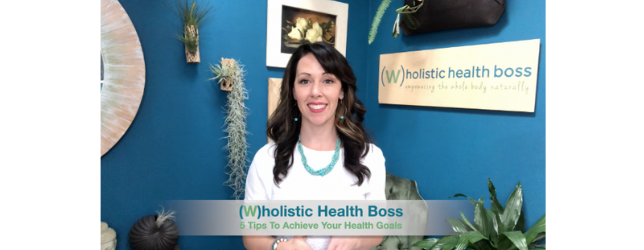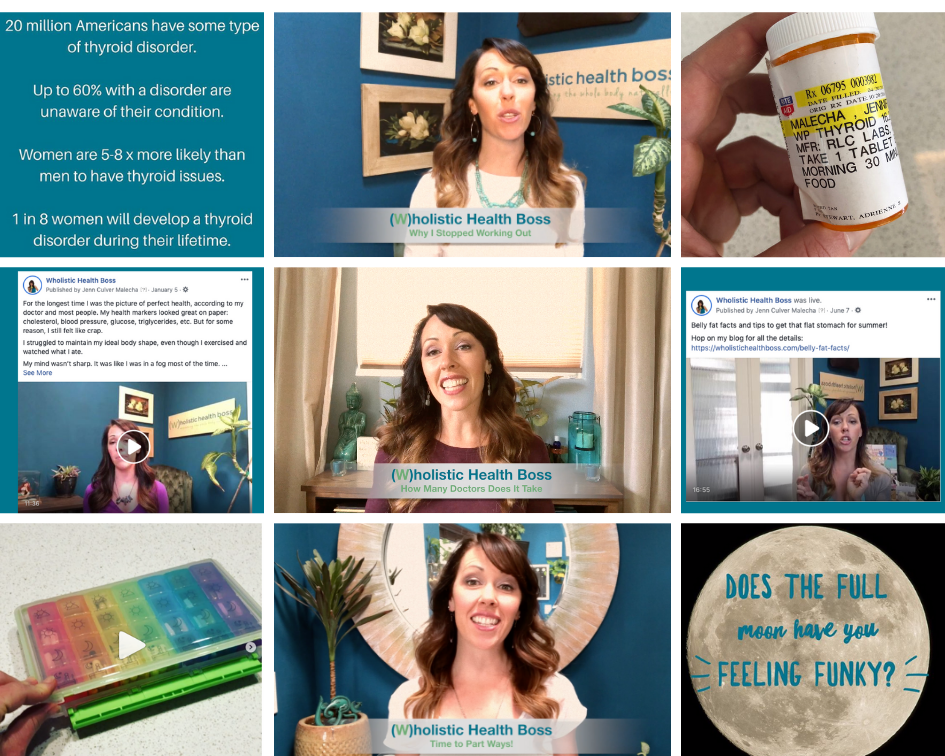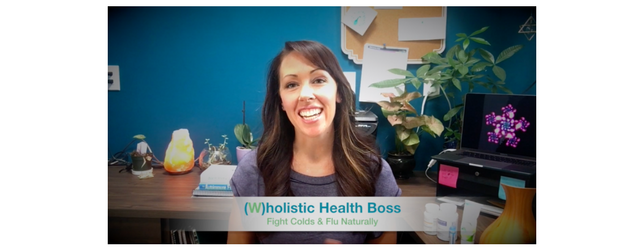Support & Heal Your Thyroid [step 2]

January is Thyroid Awareness month!
As I mentioned in the my previous blog, it’s estimated that 1 in 3 women have a thyroid disorder such as hypothyroidism, hyperthyroidism, Grave’s Disease or Hashimoto’s.
Men are less likely to have thyroid issues, but I’ve seen my fair share of men struggling with them too.
I’m a thyroid statistic, but I’m grateful to say that within 6 months of being diagnosed with Hashimoto’s Hypothyroidism, I was in remission and now my thyroid test results couldn’t be more perfect.
Unfortunately, not all women or men have their thyroid properly checked and those who are diagnosed with a thyroid disorder, aren’t always provided the right lab tests or resources to get their thyroid issues under control as quickly as I did, or ever.
Most people who are diagnosed are immediately prescribed thyroid medication, which can provide immediate relief for those who are suffering, but medication is not necessarily a long-term solution and it certainly does not solve the root of the problem.
In fact, medication can become less effective over time as the thyroid continues to deteriorate as a result of the root cause not being addressed, and over-medicating can trigger secondary hypothyroidism.
Medication doesn’t address why you might have low thyroid hormone in the first place, and if you have an autoimmune disorder it doesn’t stop the body from attacking healthy tissue; that’s simply not the mechanism of thyroid medication.
The good news is, there are natural ways to support your thyroid health, to prevent thyroid issues from happening and even reverse an existing thyroid disorder.
I want to help you elevate your thyroid knowledge so you can avoid becoming a thyroid statistic, or so you can heal your thyroid and get back to feeling like yourself again too.
In this 3-part blog series, I’m sharing with you the major steps I took, along with the steps I guide my clients through, to support and heal the thyroid naturally.
In part 1 of this blog series I addressed step #1 – knowing you thyroid numbers.
Knowing your numbers is important for a couple of reasons:
- To understand the type of thyroid imbalance (hypo, hyper, autoimmune) you might have
- How severe your thyroid situation is so you know how much support your thyroid needs
- To get a baseline so you can measure progress with different therapies you might introduce
Progress is only made in what you measure.
This week, I’ll be discussing step #2 of 3…
When I was diagnosed with Hashimoto’s Hypothyroidism back in 2016, I immediately felt overwhelmed with a sense of fear and failure.
I was afraid of what my life would look like moving forward – I wondered if I was doomed to a life full of relentless weight gain, hair loss, being constantly cold and tired all of the time.
I felt as if I had failed myself and my body – afterall, I was the “healthiest” person I knew so I questioned where had I gone wrong to cause this. But then I remembered…
…although the statistics for being diagnosed with a thyroid disorder are high, it’s not a death sentence.
The majority of thyroid disorders are a result of your lifestyle choices or factors such as:
- Foods you choose to eat
- Quality and quantity of sleep
- Frequency and intensity of the exercise
- How you deal with stress and emotions
- Toxins you’re exposed to and your body’s capacity to detox them
- Other underlying hormone imbalances, a sluggish liver, poor digestion and an overwhelmed immune system
Which meant I had more control over my thyroid health than my fears lead me to believe, and so do you.
At first the list of contributing factors might seem daunting, make you feel guilty about the choices you have made, or leave you wondering where to even start; BUT the silver lining is that with a little education, the right lab tests and resources, you can step-by-step take back control of your thyroid health.
In this week’s video and blog, I share the 2nd major step I took to boost my thyroid health so I could feel like myself again – medication free, and that has helped others to do the same.
Step #2 – Control What You Can
Despite what you might think, you do have control over the food you put in your body, the sleep you get, the way you move your body, how you deal with stress and emotions and even some of the toxins in your environment – all of which can hinder thyroid function.
Let’s be real though.
It’s impossible to be perfect every minute of every day. So instead of striving for perfection, simply trade it for presence.
Be present and start to notice what is going on in your lifestyle, what might be impacting your thyroid health, and how you can make choices to support your body in the ways it needs it most.
In the realm of thyroid supporting lifestyle choices, here are the top 4 that have made the biggest impacts on my thyroid health and the people I have worked with…
- Eating a modified Autoimmune Paleo Diet for 30-90 days to eliminate the most common inflammatory foods (grains, nuts, seeds, beans, legumes and nightshade vegetables) if you’ve been diagnosed with a thyroid issue, and if not then simply avoid or significantly reduce gluten, dairy, soy and sugar to prevent one.
- Getting high quality sleep from 10pm to 6am to promote a natural cortisol rhythm and balance within all hormones that interact with the thyroid
- Dialing back exercise intensity for a period of time or taking regular rest days to reduce the burden of stress on the body and promote recovery
- Minimizing exposure to endocrine disrupting toxins by drinking, cooking and bathing in filtered water, using non-toxic cleaning supplies, makeup, body and hair care products.
It might be unrealistic to think you could make all of these changes overnight, and I definitely didn’t.
But step-by-step you can start to shift and address the factors that can lead to poor thyroid health. Pick one thing per week, make it a habit, and once it becomes just part of what you do, move onto the next thing on the list that would support your thyroid health.
Knowing your numbers allows you to create a strategic thyroid supporting plan, take empowered action towards your thyroid health goals, track your progress and make course correction as needed.
With the right lab tests and resources, you can make educated and conscious decisions about what lifestyle factors you need to shift in order to feel your best.
And lastly, remember, your thyroid didn’t wake up one day and just decide to stop working. The culmination of lifestyle choices you have made over what could be a long period of time have led to its demise, and so it will take time to heal – have patience.
Stay tuned for part 3 next week to wrap up this blog series so you can support or heal your thyroid and live your fullest life!
1 in 3 women have this…

Did you know that 1 in 3 women are estimated to have a thyroid disorder such as hypothyroidism or Hashimoto’s?
This statistic hits close to home for me as a woman who was diagnosed with hypothyroidism and Hashimoto’s back in 2016.
My diagnosis somewhat came as a shock since I was one of the healthiest people I knew; I ate healthy, exercised daily and my doctor always commented about how I was the picture of perfect health.
But when I look back now, I can see the subtle signs that started to surface indicating something was up with my thyroid …
- I slowly started putting on weight despite eating healthy and exercising
- I felt sluggish during my workouts and struggled to recover after
- I wasn’t as efficient at work and got easily overwhelmed with tasks
- I was cold all the time when others weren’t
I simply didn’t feel like myself.
Initially I thought I was “just getting older.” However, there was a little voice inside my head saying something wasn’t right. I ignored it at first, but eventually I got to a point where I was so uncomfortable in my body I couldn’t stand it anymore.
I went to various doctors and health professionals seeking insights and not a single one checked my thyroid.
I finally decided to treat myself as one of my own clients and that’s when I got the answers I was looking for.
And now I’m grateful to say that within 6 months of being diagnosed, my Hashimoto’s was in remission and my recent thyroid test results couldn’t have been more perfect.
Unfortunately, not all women or men, who are diagnosed with thyroid disorders, are provided the right lab tests or resources to get their thyroid issues under control as quickly as I did, or ever.
Most people who are diagnosed are immediately prescribed a thyroid medication, which can provide immediate relief for those who are suffering, but medication is not necessarily a long-term solution and it certainly does not solve the root of the problem. In fact, medication can become less effective over time as the thyroid continues to deteriorate as a result of the root cause not being addressed, and over-medicating can trigger secondary hypothyroidism.
Medication doesn’t address why you might have low thyroid hormone in the first place, and if you have an autoimmune disorder it doesn’t stop the body from attacking healthy tissue; that’s simply not the mechanism of thyroid medication.
The good news is, there are natural ways to support your thyroid health, to prevent thyroid issues from happening and even reverse an existing thyroid disorder.
In honor of Thyroid Awareness month, I want to help you elevate your thyroid knowledge so you can avoid becoming a thyroid statistic, or so you can heal your thyroid and get back to feeling like yourself again too.
Over the next 3 weeks I will share with you the 3 main steps I took, and that I guide my clients through, to support and heal the thyroid naturally.
In this week’s video and blog, I share the 1st major step I took to boost my thyroid health so I could feel like myself again – medication free, and that has helped others to do the same.
Although the statistics for being diagnosed with a thyroid disorder are high, it’s not a death sentence.
The majority of thyroid disorders are a result of your lifestyle choices or factors such as:
- Foods you choose to eat
- Quality and quantity of sleep
- Frequency and intensity of the exercise
- How you deal with stress and emotions
- Toxins you’re exposed to and your body’s capacity to detox them
- Other underlying hormone imbalances, a sluggish liver, poor digestion and an overwhelmed immune system
Often it’s not just one thing that triggers a thyroid issue, it’s a combination of factors over a period of time that disrupt the natural balance of your body and ultimately your thyroid.
At first the list of contributing factors might seem daunting, make you feel guilty about the choices you have made, or leave you wondering where to even start; BUT the silver lining is that with a little education, the right lab tests and resources, you can step-by-step take back control of your thyroid health.
Over the next 3 weeks I’m going to break down the 3 main steps you can take to support and heal the thyroid naturally.
Step #1 – Know Your Numbers
To really evaluate your thyroid health you need to know all of your thyroid numbers NOT just TSH and parts of T4 or T3. Thyroid Stimulating Hormone (TSH) is produced by the pituitary gland to “stimulate” the thyroid. It tells you if the pituitary is having to work hard or not to kick the thyroid into gear, but leaves a lot to be wondered about what is actually going on with thyroid function. Thyroid hormone T4 is produced by the thyroid and then converted into T3 primarily in the liver and gut, and then in various other tissues. Total T4 and T3 represent bound hormones (not available for use) versus Free T4 and T3 represent the unbound or active forms available for use. Thyroxine-binding hormone (TBG) binds to your thyroid hormone so it can move through through the bloodstream, and Reverse T3 prevents Free T3 form attaching to your cells (inhibiting its effects). Thyroid antibodies, Thyroid Peroxidase (TPO Ab) and Thyroglobulin (TG Ab) indicate if the body is attacking its own thyroid tissue known as an autoimmune response.
Can you see why it’s important to know all of these numbers to fully understand the big picture of what is going on with your thyroid and not just a few of them?
And don’t be fooled by conventional thyroid test reference ranges that were established based on people with existing thyroid disorders. Back in 2002 the National Academy of Clinical Biochemistry even acknowledged that thyroid reference ranges were probably “skewed by the inclusions of persons with occult thyroid dysfunction,” – yet little has been done to update them.
Conventional ranges are very wide, and optimal ranges are much lower. In the functional medicine world, optimal thyroid reference ranges look something like this:
- TSH: 1-2
- Total T4: 6-12
- Free T4: 1.1-1.8
- Total T3: 120-180
- Free T3: 3.2-4.4
- Reverse T3: <15 or < than 10:1 ratio of RT3 to FT#
- TPO Ab: < 10
- TG Ab: < 20
Ask your doctor to run a full panel to include all of these markers, and if they won’t, find someone like me who will.
Stay tuned for Step #2 next week when I address controlling the thyroid affecting factors you can, and what to do about the ones you can’t.
In the meantime, check out the Free Online Hashimoto’s Days Project I had the pleasure of being a part of starting Friday, January 25th.
During this online event, experts from all over the world will be sharing their insights so you can learn more about thyroid health and related topics such as:
- Contributing factors, root causes and connections
- Simple lifestyle changes and how to implement them
- Nutritional support and balancing the immune system
- Promising, holistic therapies
Eat this for weight loss and energy!

In this week’s video and blog, I dive into more detail about why you should eat fat for weight loss, more energy and better health!
5 tips to achieve your 2019 goals (+ giveaway!)

How many times have you told yourself this is going to be the year?
The year you…
Finally lose the weight
Get your energy back
Ditch the stress and make more time for self-care
Figure out what is really going on with your hormones
Reverse your autoimmune issues and manage them naturally
Or get to the bottom of your bloating and digestive struggles
…and ultimately get back to feeling like yourself again (or for the very first time).
As most people do, you probably always start the new year with the best of intentions but quickly find yourself getting lost in the chaos of everyday life. And before you know it, the whole year has practically passed you by, and you still feel uncomfortable in your body, sick or tired all of the time.
I feel ya, I’ve fallen into this vicious cycle myself in the past.
And let me tell you, it’s not your fault if you haven’t reached your New Year’s resolutions in years past. There is no such thing as failure, only feedback. Feedback that you need a different plan of attack.
There’s more to achieving a goal than just setting one.
Marathon runners don’t just wake up one day and run a marathon. They train for it. They fuel their body for it. They buy the right clothing for it. They put energy and thought into exactly how they are going to make it to the finish line on race day.
Like training for a marathon, in order to achieve your health goals you need the right plan, resources and support.
In this week’s video and blog I give you 5 tips to help you actually achieve your health goals this year, for real this time.
I have worked with hundreds of clients, and no matter what the goal might be, I have found these 5 tips to be critical for reaching the finish of any health goal.
1 – Focus on the why, not the what
Who wouldn’t want to lose a little weight, have more energy or control of their health naturally? Those are surface goals. It’s not what’s on the outside that matters, it’s what is on the inside that will keep you motivated.
What would having more energy, control of your health and weight do for you? How would it change your life?
It would give you more confidence. You would feel more comfortable in your skin. You would be able to focus better at work, and as a result make more money. You would be a better partner and parent. You would be able to travel the world, hike the tallest mountain, do anything you physically wanted to do with a feeling of joy. You would be limitless!
When I trained for a marathon, sure there were days I didn’t want to get out of bed and run a ridiculous amount of miles. And when I was in the depths of healing Hashimotos and mold illness, there were plenty of times when I wanted to throw in the towel, but reconnecting with my “why” is what kept me going, and it’s what keeps my clients going too.
2 – Clear the clutter
Distractions are everywhere and the can come in any form; food, finances, physical clutter in your home, negative people who and drain your energy, or people who convince you to do things that aren’t in your health’s best interest.
If you have to stare the cookies in the chocolate chip eye every day in the pantry, eventually they will get the best of you.
Give yourself time to set up your environment to support the pursuit of your goals. Clear the food out of the pantry and fridge that isn’t in alignment with how you want to be eating. Put together a budget or get your finances in order so you don’t have to worry about them, and you can focus on yourself. Take one day and organize that hall closet, garage or other cluttered space in your home. And set some healthy boundaries for those people in your life who may not be on the same path as you – instead of gossiping over cocktails, grab a coffee or take a walk and set a time limit with a reasonable excuse as to why you need to get going.
Once the clutter is out of the way you can move forward on a clear path.
3 – Build upon your existing rituals
We all brush our teeth in the morning, or at least I hope you do. This is a ritual, or a habit, and something that we can build upon.
Often times what feels overwhelming about going after your health goals is the idea of having to “create time” or space to workout, eat healthy, meditate, drink more water etc. But what if you just built upon the time you’ve already carved out, the rituals or habits you already have in place?
This really helped me build a meditation practice. I started by doing just 10-15 minutes of meditation after our evening family dog walk as part of my nightly “wind down.” It eventually grew into 30 minutes and I yearned for it so much that I eventually implemented into my morning routine right before my workout.
Oil pulling is another great example for me. I do it 3 mornings per week while I prepare my dog’s breakfast – tackling two things at once! I’m all about efficiency.
Another great example that my clients really enjoy is doing their meditation in their car, in the driveway when they get home from work before entering their house. It’s a great way to disconnect from work and be present for loved ones.
Assess your current rituals and how you can build upon them with the things that you would like to be doing for yourself to support your health.
4 – Recruit the right support and resources
It’s ok to ask for help, and don’t let your ego tell you otherwise. Instead of spinning your wheels about what foods to eat, what exercise to engage in, which meditation to try, supplements to take or about anything else that might support your health goals, recruit the right experts and resources to be your guide.
As the old saying goes, “it takes a village to raise a child”, it can also take a team of experts or resources to help you reach your health goals. Set yourself up for success by hiring the right experts to hold you accountable and give you the resources you need to feel your best. Your health-goals dream team might include a personal trainer, health coach, chiropractor, acupuncturist, spiritual guide or other health professional.
YOU.ARE.WORTH.IT
5 – Stop shooting in the dark
If you’ve “tried everything” when it comes to diet and exercise, yet nothing seems to work then it’s time to test instead of guess. You are unique and therefore your diet, exercise, sleep, supplements and stress reduction needs will be too. What works for one person isn’t exactly going to work for you.
When your attempts to lose weight, increase your energy and get your health back under control aren’t working, it’s a sign that something bigger is going on beneath the surface such as hormone imbalances, liver congestion, poor nutrient absorption or fat for fuel metabolism, and your typical blood tests won’t pick up on these hidden dysfunctions.
Your results will always be lacking, no matter how many diets or workout routines you try, if you’ve got something greater going on under the hood.
So stop shooting in the dark, run some functional lab tests that will give you a bigger picture of your overall health and take a more strategic, and personalized approach to reaching your health goals this year.
Let me know how I can support you more in achieving your 2019 health goals…
As the (W)holistic Health Boss, my mission is to support busy, health-minded people like you in getting access to the right lab tests and resources so you can find the missing pieces to your health puzzle and get back to feeling like yourself again (or for the very first time!).
Here’s to you achieving your health goals this year!
(P.S. I would be thrilled to be on your team and I’m currently offering 20% off my coaching programs. Schedule a complimentary Ideal Health & Weight Discovery Session here)
2018 Health Tip Highlights

Wow. Can you believe how fast 2018 has come and gone?
I swear, the older I get the faster time moves.
So much has happened in the world of health in 2018…
- Counting calories and portion control is becoming a thing of the past
- Low-fat diets are out, high-fat diets are all the craze and healthier in a lot of ways
- Stress is finally getting attention for being the #1 contributor to weight gain
- Glyphosate (aka Roundup weed killer) was publicly proclaimed to cause cancer
- The importance of sleep has come into focus with the wide range of activity trackers on the market
On average it takes almost 18 years for this type of new information to hit your doctor’s desk; so more and more people are turning away from conventional medicine due to the lack of solutions, and seeking more personalized care from functional and holistic health-minded professionals like myself.
As the (W)holistic Health Boss, my mission is to help keep you up to speed on the latest information, tips, tools and resources so you can find the missing pieces to your health puzzle and feel like yourself again or for the very first time.
This year, I’ve written over 42 blogs and hundreds of social media posts to educate and empower you about the right lab tests and resources you need to achieve your ideal health and weight.
But if you’re anything like me, then life has surely been busy and maybe you’ve missed a few of the important things I had to share with you.
So to close out 2018 I’ve compiled the top tips and pieces of information I shared in 2018 in hopes that these will give you the insights you need to kick off 2019 with a healthy bang!
Even if you read them the first time, read them again. A new golden nugget of information just might jump out at you!
As you reflect on the year, take a moment to envision what you want for yourself and your health in 2019.
Do you want more energy?
To lose weight so you can feel great in your body again?
To finally put your digestive issues, anxiety or crappy nights of sleep to rest?
All so you can feel healthy, strong, free and limitless to be adventurous and live life to the fullest every day?
If so, then 2019 is your year.
I’m currently taking a limited number of clients and offering a 20% discount on all of my coaching packages for those who want to start 2019 strong with a personalized, yet strategic health-building plan that is realistic and produces long-lasting results.
Schedule a complimentary Ideal Health & Weight Discovery Session here to explore the possibilities.
And enjoy these top health tips from 2018!

Top Blog Posts
- Why I Stopped Working Out: How exercise can prevent or even cause weight gain
- It’s Time To Part Ways: How I got off thyroid medication and never looked back
- How Many Doctors Does It Take To Get Healthy: Tuning into your body and taking back control of your health
Top Facebook Videos
- Belly Fat Facts: Facts about belly fat and tips to get rid of it
- 3 Reasons You Look Good On Paper But Feel Like Crap: Why typical blood tests don’t tell you squat about your health status
- Difference Between Eating Healthy & Right For Your Body: Why not all healthy foods are right for your body
Top Instagram Posts
- Full Moon’s Effects On Your Health: The connection with the full moon cycles, your digestion and mood
- Supplement Organizer: My favorite supplement organizer from Amazon
- Contributing Factors To Thyroid Disorders: Breakdown of the most common contributing factors to thyroid disorders
Wishing you a happy holiday season and New Year!
Upcoming Events & Specials
20% Off Coaching Packages – FREE Consultation Session!
One conversation can change your life. During this FREE 45-minute session, I will devote my time to exploring what’s been going on with you, where your biggest healing opportunities are and what you should do next to take back control of your health and become your own health boss!
Let’s explore the possibility of working together; and if we do, you’ll save 20% off any coaching package! Tell me a little about you and with what I can help. Fill out the form on the link below and get access to my calendar to schedule an appointment.
The #1 problem with PCOS

“Polycystic ovary syndrome (PCOS) is a hormonal disorder common among women of reproductive age. Women with PCOS may have infrequent or prolonged menstrual periods or excess male hormone (androgen) levels.” – The Mayo Clinic
That sounds like almost every woman I’ve ever known.
How many women do you currently know, or have you known, who’ve suffered from hormonal disorders, long or painful periods during their reproductive years?
Too many for it to be ignored I’m sure.
PCOS is one of the most commonly diagnosed conditions for women between the ages of 15 to 49. Some studies show that up to 15% of women are diagnosed with PCOS during their routine gynecology visits.
But just because it’s common doesn’t mean it’s normal.
So why is PCOS so prevalent these days?
To explore this more, let’s take a look at what PCOS actually is and how it happens…
According to the Mayo Clinic, PCOS is when, ”the ovaries may develop numerous small collections of fluid (follicles) and fail to regularly release eggs. Early diagnosis and treatment along with weight loss may reduce the risk of long-term complications such as type 2 diabetes and heart disease.”
Classic symptoms of PCOS can include:
- Infrequent, irregular or long periods
- Excess facial and/or body hair growth
- High blood sugar or insulin resistance
- Hair loss
- Acne
However, those symptoms can also correlate with high or low estrogen or progesterone, hyper- or hypo-thyroidism, autoimmune conditions such as Hashimoto’s or Alopecia, nutrient deficiencies, a congested liver, carbohydrate intolerance or a high carbohydrate diet, too much sugar, food sensitivities and the list goes on.
All of which left unaddressed lead to an influx in inflammation, deeper metabolic dysfunction and can trigger issues with the ovaries.
The most accurate way to diagnose PCOS is with a vaginal ultrasound to see if the ovaries are enlarged, have follicles and are failing to function.
The #1 problem with PCOS is that it’s preventable and irreversible but nobody is talking about that.
Regardless of how PCOS is diagnosed, whether from a cluster of symptoms or an ultrasound, the reality is that it’s a lifestyle disease – meaning lifestyle factors such as diet, sleep, exercise, stress and toxins exposures are the driving factors. In this week’s video and blog, I uncover the lifestyle factors leading to PCOS, and how you can prevent or reverse it by changing your lifestyle.
All of us have genetic predispositions to certain disease states. Some of us reach disease states early in life, others later in life and others never at all.
So what is the deciding factor? Your lifestyle.
The food you eat, your sleeping habits, the way you exercise, how you handle stress and the toxins you’re exposed to all have an effect on your genetic code and signaling.
Your body can handle unhealthy indulgences from time to time, crappy sleep occasionally, ebbs and flows in your exercise routine, a little toxin exposure here and there, and even the daily stress of life.
But when all of that becomes more routine, more consistent and chronic, eventually the compiling factors cause the circuits in the body to break in a sense-triggering genetic expression, metabolic dysfunction and disease states.
Symptoms are the last to show up when metabolic dysfunction is in place.
PCOS is a cluster of symptoms used to diagnose women once metabolic dysfunction has already been in place for a while.
The 4 biggest driving factors of PCOS are:
- A diet too high in sugar and/or carbohydrates
- Prolonged periods of mental/emotional stress
- Staying up late or getting broken sleep
- Consistent exposures to endocrine disrupting toxins
While these factors might seem unrelated, they all have something in common. They directly impact insulin levels, cortisol and hormone balance, and ultimately fuel inflammation.
The good news is that the body is very resilient, and in most cases metabolic dysfunction is reversible given the right diet, lifestyle changes and tools.
When it comes to PCOS, I see so many women feeling doomed by their diagnosis, limited, and at a loss for getting back to feeling like themselves because no one is talking about how they can take back control of their health and body by making some basic lifestyle changes.
The 4 biggest lifestyle shifts a woman can make to prevent or possibly reverse PCOS are:
- Eating a diet lower in sugar/carbs, and higher in healthy fats and proteins
- Being asleep by 10pm and sleeping through the night the majority of the week
- Establishing a daily ritual to release stress using deep breathing or meditation
- Creating a low or toxin-free home and work environment
These 4 shifts will reduce inflammation, balance blood sugar and insulin levels, stabilize cortisol hormone rhythms, minimize external and internal impacts on estrogen, testosterone and progesterone, and ultimately lower the load on the body allowing normal metabolic function and hormonal balance to return.
Let’s start a conversation about how to prevent, or even reverse, disease states such as PCOS instead of settling for a diagnosis.
I help health-minded people just like you get their hands on the right lab tests and resources so you can prevent or reverse conditions such as PCOS and live your fullest life.
If you want to explore the possibilities of feeling like yourself again (or for the very first time!), then I want to invite you to schedule a complimentary Ideal Health & Weight Discovery session with me today here!
#TBT – I rarely talk about this [Alcoholism and Autoimmunity]

Tomorrow marks the 2 year anniversary of losing my mom to alcoholism.
As I prepare for my road trip to celebrate her life with loved ones, I can’t help but reflect on how my mom’s addiction has shaped my life in so many ways, how it contributed to the health issues I’ve encountered over my lifetime, and how it has helped me heal and find gratitude for the life and health I have.
We often don’t talk about the struggles in our lives for fear of being shamed or of guilt; yet if we did talk about them more it would release us of the burden and elevate our health.
I chose this Throwback Thursday blog in hopes that it will help you find the courage to share your struggles too so you can overcome them, find gratitude for them, heal the habits that have formed as a result of them, and get back to feeling like yourself again (or for the very first time) like I have.
***
I rarely talk about this, but enough time and healing has happened for me to be ready to share this part of my story with you. My growing gratitude for this experience with my mom has shed so much light on opportunities for me to not only create greater health and happiness for myself, but to also inspire others to do the same.
So here goes…
I’m not quite sure where my genetic predisposition to autoimmunity came from. I suspect that both of my grandmothers had some kind of thyroid dysfunction, but they lived in an era when nobody was looking for or talking about autoimmunity.
In order to have an active autoimmune condition, three things must be in place:
- You have the gene for it – a genetic risk factor or pre-disposition
- You have a leaky gut – impaired digestion and immune system function
- You’ve come in contact with a trigger – various triggers include things such as gluten, environmental toxins, certain parasites, bacteria or yeast overgrowth in the gut, viruses such as mono/Epstein Barr or different Herpes strains and more
My mom didn’t have an autoimmune condition, at least not that I know of, but the effects of her alcoholism certainly played a role in why I do.
Autoimmunity can be detected 10 years before a clinical diagnosis is ever given.
Antibodies are the markers for autoimmune activity in the body, and there are blood tests to detect antibody activity in the early stages. Yet, doctor’s don’t preventatively look for autoimmunity. They only test for it once someone is visibly suffering from what looks to be an autoimmune condition, which usually means the person is at the point of a clinical diagnosis.
However, when autoimmunity is caught early on, reversing it is much easier.
I can look back now and practically pinpoint the time when my autoimmune process likely started occurring more than 20 years ago.
I was the girl who had it all together – straight A’s all throughout grade school, I hung out with the cool kids, went off to college, I excelled in every job I had, and quickly climbed the career ladder into high level management positions.
All the while, I was sacrificing my health for acceptance and success.
The effects of addiction on friends and family members are not something most people openly talk about. Those who have been affected carry a lot of shame and guilt with them or a fear of being abandoned if people really knew their family situation.
I carried the burden of these feelings for a long time, and as a result I didn’t always make the right choices to support my health.
As I know now, and as the research of epigenetics shows us, our lifestyle choices directly alter the cells in our body to either create illness or to support health.
In the past, the ways in which I chose to cope with my mom’s drinking habits and the feelings related to it were very unhealthy:
- I started drinking in high school to be “cool” and accepted by others
- I found myself in a string of codependent and unhealthy relationships
- I was a control freak about everything (this is a signature trait of a child raised by an alcoholic)
- I engaged in full on screaming matches with my mom over her drinking that left me completely emotionally drained
- I used work as a distraction and a means to validate my worth – my career success covered up my family dysfunction
- I hustled all week working 12 hour days or 50 plus hours a week, and socially binged on the weekends, never leaving time for me
Over the years, my body was giving me clear signs on just how much my mom’s addiction and my reactions to it were impacting my health:
- I had painful and irregular periods right from the start, and birth control was the bandaid I was given – a red flag for estrogen and progesterone imbalances
- Waves of fatigue followed in high school and became more constant in college and thereafter – adrenal dysfunction was setting in and maybe a case of undiagnosed mono
- I developed allergies out of nowhere and sensitivities to fragrances or chemicals in my early twenties – a huge clue for leaky gut!
- I was diagnosed with skin cancer at the early age of 25 – a sign my cells were sick
However, according to my conventional doctor, on paper I was the picture of perfect health. Once I became a Functional Diagnostic Nutrition Practitioner, about 15 years into my mom’s alcoholism, I was able to get my hands on the right lab tests which showed just how dysfunctional my health had become due to the choices I had been making.
My test results showed:
- Severe adrenal dysfunction
- Poor liver and detoxification function
- High levels of oxidative stress and DNA damage
- A gut full of bacteria, parasites and yeast overgrowth and a weakened immune system
These were all early signs of an autoimmune process being in place. Had I run a test to look at autoimmunity specifically at the time I’m almost certain I would have had elevated antibody markers too.
In this week’s video and blog, I share more about the link between alcoholism and autoimmunity and what I’ve done to overcome it.
“When we focus on others, our lives become unmanageable” – a teaching from the Twelve Steps of Adult Children workbook
In response to my mom’s addiction, I had become so focused on managing her and her condition that my own personal life was unmanageable in a sense.
Almost everything I did centered around a reaction or direct action related to her condition in order to keep the peace, assimilate a sense of control in otherwise chaotic circumstances or to cover up what I didn’t want people to know.
The desire to be the opposite of an alcoholic was my priority, not my health.
It wasn’t until my mom had a near death experience 6 years before she actually passed away that I decided my health needed to be my priority. I realized I had sacrificed myself enough and life was certainly too short to keep going down that road.
Shortly after that realization is when I started to immerse myself in more functional and holistic health practices. I reversed my adrenal dysfunction, started healing my gut, and supporting my detoxification system better.
I was doing all of the “right” things from a scientific perspective – eating a Paleo style diet, exercising, taking supplements and getting satisfying sleep. But some of my old behavior patterns around control, how I dealt with emotional situations and lack of self worth persisted.
Having your best health and feeling like yourself requires work in all areas of life.
By the time I started to work on my physical health by changing my diet, getting more rest, taking the right supplements and reducing stress, the autoimmune process was already in place and through the physiology of epigenetics my mindset kept feeding it. You have to get your mind right to get your body right.
Part of untangling the autoimmune web for me has been addressing the effects that my mother’s addiction has had on how I handle life. I have learned to:
- Make choices from a conscious place to maintain my health as a priority
- Own my story without guilt or shame, but rather with compassion and gratitude
- To let go more and care less about the little things so I can focus on myself
- Forgive my imperfections and use them as tools to walk away from what is not me and find what is me
These are just a few of the changes I’ve made in my life to create greater health and reverse my autoimmune condition over the years.
Molly Hamill and I did a great webinar earlier this year talking more in-depth about how to activate and upgrade your healing process from the physiological and energetic aspects. You can check out the replay of the webinar here.
All of us have grown up in unique situations or experienced some kind of crisis in our lives. Alcohol addiction is only one example of this, but how we choose to deal with those situations can be the differentiating factor between having perfect or poor health.
In my 1:1 client coaching programs, I work with people to identify the physiological aspects contributing to poor health by running lab tests to look for underlying imbalances in the body, and by addressing old behavior patterns or beliefs that keep them from taking care of themselves like they want to be.
By doing this work on myself, I now have a better relationship with my mom and her situation than I ever did when she was alive. I am extremely grateful for what I have been exposed to, what I have learned and how I can share my experience to help others.
***
Using over a decade of personal training experience, training in Functional Diagnostic Nutrition and Transformational Coaching, I create personalized health-rebuilding programs for clients that are realistic and sustainable for long-lasting results, and that empower you to be the boss of your own health.
Finding your ideal health and weight isn’t just about the food your eating, the exercise you’re doing, the supplements you’re taking, how you’re sleeping or the amount of stress you have – it’s also about who you are being as a person and how you are navigating life. This is why I infuse transformational coaching tools into the work I do with clients, so you can learn to navigate life differently to support your health goals.
If you want to finally get to the bottom of what is keeping you from feeling like your best self and having your best health, then let’s see how I can help. Schedule a complimentary Ideal Health & Weight Discovery Session here.
Hair loss confessions and solutions

Losing your hair is never fun; not for men or women. I’ve had countless clients who have experienced hair loss due to thyroid disorders, autoimmune conditions, stress, nutrient deficiencies and more.
Your hair is part of your identity so it’s not an easy thing to lose. It’s what makes you look like who you are. It’s part of how you identify with yourself in the mirror and even how others identify you – I mean it is a required feature on any type of official ID such as your driver’s license or passport. It gives you confidence, makes you feel sexy, attractive and good about yourself. Even if bald is your thing, it still defines you.
So when my hair started falling out a few months ago, I was in denial.
My hair has been a treasured part of me since I can remember. As a little girl I loved styling it my own way and I’ve never had the guts to cut it any shorter than my shoulders because I love my luscious locks.
But for some reason when my typical hair shedding increased, I shrugged it off and made excuses for it…
It was because the change in seasons
I went too many days without washing my hair
I wasn’t brushing it enough
I was working more and under more stress
You know, the usual things.
I just kept thinking, “if I just give it time it will stop.”
As the months went by and my hair continued to clog up the shower drain in larger quantities than I had ever seen before, I started to question what my body might actually be trying to tell me.
My hair wasn’t falling out by the handfuls, but something was certainly up.
Overall, I had been feeling really great health-wise. My energy was even and up. I was sleeping soundly through the night and getting to bed at a reasonable hour. I was exercising regularly, taking active rest days and being mindful of not over-doing it. And I had recently recommitted to a modified AIP (Autoimmune Paleo) Ketogenic style diet again to restore my body after a busy summer schedule.
However, I was working more than usual and likely under more stress than I would like to admit.
We recently found another source of mold (ugh, for the 3rd time) in our home which certainly could have been a contributing factor.
And as someone who had been previously diagnosed with Hashimotos, an autoimmune thyroid disorder, I was at risk for other autoimmune conditions such as Alopecia.
Whatever the reason was for my hair loss, I was determined to get to the bottom of it so I could get back to feeling like myself again with my luscious locks.
In this week’s video and blog, I confess more about my hair loss and share natural solutions to getting those luscious locks back.
The quality of your hair is a measurement of your health.
I put on my health detective hat and got to work.
The first order of business was to research possible causes for hair loss and which ones might pertain to me.
The most common causes of hair loss are:
- When thyroid hormone T3 is low
- Changes in estrogen and progesterone
- Alopecia (an autoimmune condition) is activated
- Vitamin and/or mineral deficiencies
- An increase is mental, physical or emotional stress
- Toxic exposures such as mold and heavy metals
- Drastic changes to your diet
- Improper scalp care and/or cleaning
- Poor circulation
I could relate to just about every one of these risk factors, even Alopecia (although I had never been diagnosed with it) because once you have one autoimmune condition your risk for others increases.
So I started the process of elimination by checking my thyroid hormones to make sure all was running right and that my Hashimotos hadn’t flared back up.
To my delight my thyroid hormone and antibodies were practically picture perfect. So I checked thyroid and an autoimmune flare-up as an issue off my list.
I exercise daily and didn’t have any other symptoms of poor circulation such as cold hands or feet, or muscle fatigue. And although life had been a little more work-ful and stressful, I still had a twice-daily meditation ritual in place and I didn’t feel an inability to handle stress, so I bumped circulation and stress as possible causes lower on my list of risk factors.
My mood was stable, cycle perfectly timed every 28 days and easy, I was sleeping soundly and acne wasn’t problem so estrogen and progesterone didn’t seem to be a culprit either.
That left me with:
- Drastic changes to diet
- Vitamin and/or mineral deficiencies
- Toxic exposures such as mold and heavy metals
- And improper scalp care and/or cleaning
I decided it was time to call in a hair specialist to help me research this further and I schedule a microscopic hair analysis appointment at my Naturopathic Doctor’s office (shout out to Nourish Medical Center for offering such a wonderful service!).
The analysis confirmed I certainly had a condition called Telogen Effluvium going on which can be triggered by a variety of things such as the drastic changes in diet, deficiencies, toxins and improper scalp care that I was suspicious of.
It’s tough to say exactly what the root cause for Telogen Effluvium is, and it could be a variety of things.
So based on my most likely factors here is what I’m doing to solve for hair loss:
- Loosening up on my Ketogenic style diet to boost my food nutrient intake
- Remediating the mold and thoroughly cleaning our home
- Making sure I take collagen peptides daily to promote hair growth and strength
- Consuming lots of gut healing foods and supplements for adequate nutrient absorption
- Using a specially formulated hair care products to cleanse my scalp properly, promote circulation and strong hair regrowth
If you or someone you know has been struggling with hair loss, I recommend going through a similar process of investigation as I did. Do your research, consider your risk factors, investigate possible causes through process of elimination and ultimately support your body naturally through diet, exercise, rest, stress reduction and toxin elimination to restore luscious locks.
If you’re interested in getting your hands on the right lab tests and resources to solve your hair loss struggles so you can get back to feeling like yourself again, schedule a complimentary Ideal Health & Weight Discovery Session with me today here!
#TBT Fight Cold and Flu Season Naturally

This past week I’ve talked to at least 5 people who have been out for the count recently because of a nasty cold or flu bug that has been going around.
Getting sick is no fun, so in true Throwback Thursday fashion I’m bringing back this blog to help you fight this season’s colds and flu naturally so you can feel your best to enjoy all the festivities that fall and winter bring!
***
Fall is officially here, meaning cold and flu season is swinging into full force, and seasonal allergies are reaching their peak for some people.
How do I know this? Well, there are some obvious signs such as the leaves changing colors and falling from the trees, or the Halloween decorations that are painting every house and storefront these days. And for anyone who still watches regular cable TV, commercials promoting flu shots, cold medicines and allergy relief are being broadcasted more frequently.
Years ago, I suffered from seasonal allergies and the occasional nasty sinus cold. I would load up on symptom relievers, such as DayQuil, NyQuil, throat lozenges, Mucinex, and Tylenol or Advil for my painful earaches.
Now I take nothing.
No, really. I no longer have to take any over-the-counter symptom relievers because I don’t suffer from seasonal allergies anymore, and I haven’t had a cold or the flu in so long that I can’t even remember the last time I did (keep reading and I’ll tell you why).
I’m not superhuman or anything. I still occasionally feel the shift of the seasons in my body – my energy is lower some days, I get a slight runny nose or tickle in my throat when Spring or Fall bring about new allergens in the air, and I even feel the onset of what might be a cold from time to time.
BUT my symptoms are tolerable and I can stop them naturally.
When we take over-the-counter (OTC’s) medications, we have a false sense of healing our body in some way. What we’re really doing is just masking the symptoms until our body is able to make a slow and full recovery. This is why over the years allergies, colds and flus become more intense, frequent, and longer in duration.
When we mask symptoms with OTC’s, we’re ignoring our body’s call for help.
As annoying as a runny nose or postnasal drip can be, it’s your body’s way of saying, “Hey, something is really stressing me out right now or I’m under attack. I’m trying my best to fight it off, but I could really use your support and help.”
We’ve been taught to “push through it” when we get sick or feel under the weather. We use OTC’s to numb the pain so we can still go to work and take care of all our responsibilities, except for ourselves. But what is the price we pay in the long run for continually taking this action?
Nobody ever reads the warnings or the side-effects list on an OTC medication. I mean, they’re over the counter so they must be safe, right?
Wrong.
OTC’s come with a laundry list of negative side-effects that can occur acutely or chronically over time. Here are just a few OTC’s side-effect highlights that we commonly overlook …
- Acetaminophen (aka Tylenol) – liver damage
- Ibuprofen (aka Advil or Motrin) – peptic ulcers and kidney damage
- Decongestants – high blood pressure or blood pressure spikes
- Antihistamines – damage to heart muscle and the central nervous system
Large or small, long or short, any usage of OTC’s impacts the body’s ability to function normally and disrupts its homeostasis (balance). They do not boost our immunity, they block it.
OTC’s also are one of the number one contributors to leaky gut (aka intestinal permeability or dysbiosis), and guess what happens when you have a leaky gut?
A leaky gut increases your risk for allergies, colds and flus.
The gut is where 80% of your immune system lives, so if it’s dysfunctional guess what else is going to be dysfunctional? Your immune system, and your ability to fight off allergies, colds or the flu.
When the intestinal lining is compromised you’ve lost your first line of defense internally. Foreign invaders such as allergens, bacteria and viruses are able to cross the gut barrier and get directly into the bloodstream.
In this week’s video and blog I talk more about boosting your immune system by using natural remedies for allergies, colds and the flu to keep your gut and health intact.
One of the first health improvements my clients usually notice very quickly in our work together is that they don’t get sick anymore, or when a cold starts to come about it doesn’t fully develop and they make a very quick recovery from it.
It’s not magic, it’s just allowing the immune system to do its job.
The very first thing I focus on with ALL of my clients is digestive support and repair for 3 very important reasons:
- To boost the immune system, which lives in the digestive tract
- To increase nutrient availability for the body
- To reduce inflammation and stress on the body
Healing your gut is the key to sustainable health success, but healing the gut is a process which requires consistency. It can take months or even years to fully recover in some cases.
In order to heal the gut, you have to consistently:
- Avoid inflammatory and toxic foods such as gluten, dairy, sugar, soy and alcohol
- Get rid of gut bugs such as parasites, bacteria and yeast (candida)
- Add in foods and supplements to help repair the integrity of the gut, such as digestive enzymes, fish oils, L-glutamine, probiotics, collagen peptides, bone broth and fermented foods
Healing my gut is what has made my seasonal allergies virtually non-existent and has given me the superhuman powers to fight off a cold or the flu before it even really gets started.
However, my immune system obviously wasn’t always able to do this. I suffered for years before I started to take action on healing my gut, and when I did the results weren’t immediate. It took time. In the in-between time of healing, I still had to find ways to lessen the pain and suffering without using OTC’s that would just set me back gut health-wise.
I began to slowly transition away from gut damaging OTC’s and introduced more natural therapies to boost my immune system and my body’s own defense system.
Some of my favorite natural remedies for allergies, colds and the flu include:
- Taking a supplement with quercetin and/or nettles leaf for allergies – this is something I do automatically when the seasons change to boost immunity
- Combo of peppermint essential oil (diffused or topically) and arnica (ingested or topically) for tension headaches, migraines or aches/pains
- Vitamin C, D and Zinc to fight off viruses and the flu – taken preventatively or acutely
- Oil of oregano and/or garlic as a supplement for anti-microbial properties to kill off bacteria and prevent colds or sinus infections
- Ginger or peppermint tea and bone broth for upset stomachs
For even more ideas on natural remedies to relieve your symptoms and support your immune system in defending you naturally, check out these other resources:
- Wellness Mama’s Natural Remedies for Illness – she even makes her own cough syrup
- Chris Kresser’s How To Prevent Colds & Flus Naturally OR The Truth About The Flu Shot & What To Do Instead – how to prevent and treat colds or the flu naturally
- Dr. Mercola’s Flu Attack! How A Virus Invades Your Body – how the flu happens and how to avoid it
We forget that OTC’s haven’t always been around yet our ancestors found natural ways to ease pain, suffering and symptoms. Natural remedies are still relevant and still work in our modern day world. We just have to seek them out.
Aside from using natural remedies and healing your gut, there are a few other really important things when it comes to having the strength and stamina to fight allergies, colds and the flu naturally – making sure to eat nutrient dense foods, getting good quality sleep, exercising, drinking plenty of water and taking time to de-stress on a daily basis through meditation or some other type of modality.
Bottomline is, you don’t have to suffer or mask your symptoms with superficial remedies. You can become your own health boss and thrive in this world any season of the year!
***
If you want to heal your gut to avoid allergies, colds and the flu altogether the same way my clients and I have, then schedule a complimentary Ideal Health & Weight Discovery Session today here.
Tummy Talk

In the United States alone, it is estimated that 60% of the population (or more) is dealing with at least one symptom of digestive dysfunction — gas, bloating, heartburn, constipation, diarrhea, stomach pain, candida, and the list goes on.
Living with digestive problems has become the new “normal.”
But digestive issues aren’t normal, they’ve just become common.
Don’t believe me? Just count how many TV commercials, in one hour, address at least one type of digestive issue.
Typically, digestive issues begin as minor complaints — a little indigestion here and there, the occasional tummy ache or bout of heartburn — and sooner or later, what was once a minor annoyance becomes something that can literally take over your life. This usually happens for two reasons — embarrassment or lack of knowledge.
Aside from my functional medicine and closest friends, most people find it embarrassing to talk about their bathroom habits or digestive dilemmas but frequently find themselves sprinting to the nearest bathroom, feeling weighed down by a rock in their stomach or popping antacids like candy.
And others just don’t know any better. Either digestive issues run in their family and they’ve accepted that they are doomed to have them too, or they don’t see the connection with a symptom that is far removed from the source such as acne, anxiety, depression or eczema.
In any case, they’ve simply settled for what they’re dealing with on a daily basis.
Digestive issues should not be ignored, it’s your tummy talking to you.
The digestive system plays a vital role in making sure the body receives the nutrients it needs, in supporting the immune system, and in protecting us from bad guys such as toxins.
If your digestive tract isn’t up to speed, then you’re pretty much guaranteed to run into bigger health issues down the road…or maybe you already have?
Think about it.
If you’re not digesting properly, then you’re not getting enough protein to feed your muscles, vitamins to keep your energy or mood balanced, and toxins aren’t being eliminated making for a toxic internal environment.
In this week’s video and blog I’ll help you decipher what your tummy is talking about, explain why you should be listening and how to respond.
Do you experience any of the following?
- Less than 1-2 bowel movements per day
- Adult acne, eczema, psoriasis, skin rashes or breakouts
- Anxiety, depression, mood swings or a nervous stomach
- Fatigue, cloudy thinking, trouble losing or maintaining weight
- Seasonal allergies, frequent common colds or sinus infections
- Loose stool or an unexpected urgent need to use the bathroom
If you answered yes to any of these then your tummy is trying to talk to you, and you could be suffering from digestive dysfunction.
And chances are, your doctor is unaware of the growing number of research studies demonstrating these alarming findings related to your digestive health:
– The toxicity of persistent constipation may cause common, everyday symptoms like fatigue, attention deficit, and brain fog.
– Autoimmune conditions like Hashimoto’s thyroiditis, rheumatoid arthritis, and multiple sclerosis are almost always rooted in digestive dysfunction.
– Inflammation from gut dysfunction can spread throughout the body, causing inflammation in the brain, joints, sinuses, other important organs and deplete mood balancing hormones known as neurotransmitters.
Digestive dysfunction can cause a cascade of stress throughout the body.
Most doctors are either unaware of this information, lack the training to link digestive dysfunction to other health issues or don’t have enough time to get to the bottom of it. Meanwhile, people like you are paying the price in unnecessary suffering, over the counter digestive aids and medical bills.
As Dr. Nasha Winters (ND), author of The Metabolic Approach to Cancer, says “you are what you don’t poop.”
The good news is…
Digestive dysfunction can be resolved through proper nutrition, rest, exercise, stress reduction and supplementation. As a functional health coach, this is the foundation of the work I do with all of my clients because it relates to just about every single health issue.
I’ve seen clients go from one bowel movement a few times a week, to twice a day in as little as a week after making simple changes to their diet, lifestyle and taking supplements to support their digestive health.
And as a result, they feel lighter, more energized, clear minded, happy, free and at home in their body!
It’s time to listen to your tummy talk, and to stop settling for a life less lived.
If you want to get your hands on the right lab tests and resources to understand what your tummy is talking about, to test and not guess, simply schedule a complimentary Ideal Health & Weight Discovery Session with me today here!
